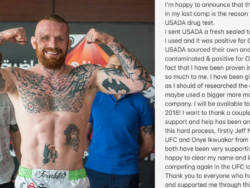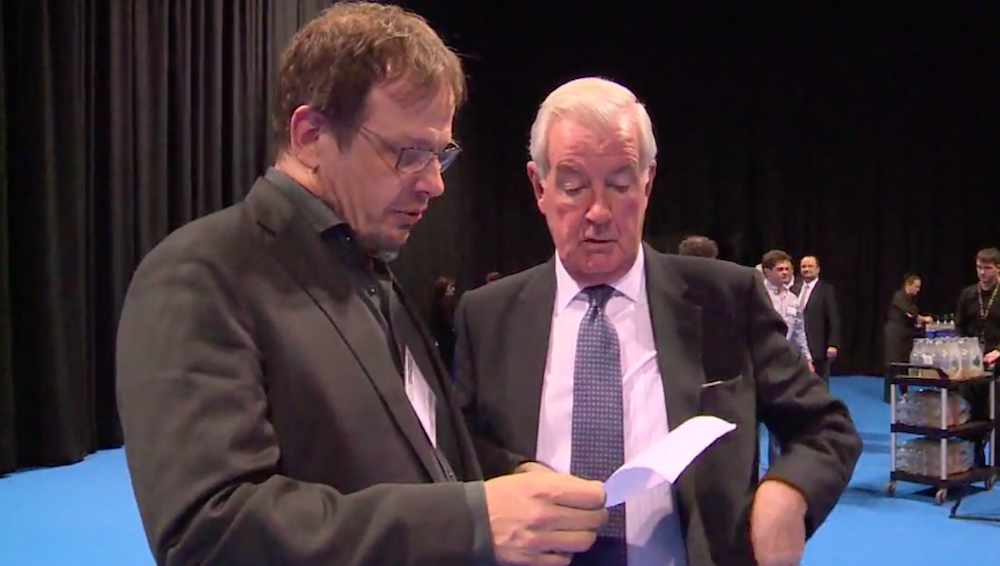The trouble with Ostarine: Jimmy Wallhead’s
16th March 2018
Features


A new documentary by ARD and Le Monde has alleged that an International Association of Athletics Federations (IAAF) scheme to cover up doping positives extended to five additional Russian athletes, and that the World Anti-Doping Agency (WADA) was aware of the situation in September 2014. ‘Doping – Top Secret: The Protection Racket’ alleges that €3.45 million was paid in bribes to cover up positive doping tests reported by Yuliya Zaripova, Vladimir Kanaykin, Valeriy Borchin, Sergey Kirdyapkin and Olga Kaniskina, who were allowed to compete at the London 2012 Olympics. ARD and Le Monde claim to have accessed French prosecutor’s files in connection to their case against former IAAF President Lamine Diack and his son, Papa Massata Diack.
The five athletes are in addition to Liliya Shobukhova, from whom €450,000 was extorted by IAAF officials to cover up anti-doping rule violations (ADRVs) for over three years. The documentary also shows evidence that despite the payment, Shobukhova was only permitted to compete at London 2012 as long as she didn’t contest for the medals. In the event, she failed to finish the marathon.
Email correspondence allegedly shows that the IAAF were aware of the situation on 18 November 2011. An attachment to the email apparently shows abnormal blood values for the five extra Russian athletes, who were not banned until January 2015 by the Russian Anti-Doping Agency (RUSADA).
In February 2015, the IAAF claimed that the Zaripova sanction illustrated the ‘robustness’ of the anti-doping system. However in March 2016 – after the system for extorting money from Shobukhova had been exposed – it was forced to appeal to the Court of Arbitration for Sport (CAS) to extend the sanctions against the five extra athletes listed above, after finding that ‘selective’ disqualification of their results had allowed them to retain medals won whilst doping.
Emails to the IAAF when they attempted to ban the athletes in 2014 appear to indicate that both parties knew what was going on. ‘We strongly believe that the only way to avoid a huge scandal concerning covering up the numerous ADRV, which also involved almost all responsible IAAF officers, is continuing joint efforts to keep the situation “under the table”, as it was happening all these years’, read an email from ‘Valentin’ – understood to be former Russian Athletics Federation (RusAF) President and IAAF Treasurer Valentin Balakhnichev, who was one of three IAAF officials banned for life in January for extorting money from Shobukhova. ‘Consequently, the official sanctioning – including disqualification of results and medals – is a direct way to destroy both the ARAF and IAAF.’
Prosecutors in France are investigating allegations that Lamine Diack received €1.5 billion from Russia in 2011 – when the Russian athletes named above were facing doping bans. It is understood from the documentary that he has denied the allegations. However the documentary alleges that millions of Euros in contracts passed between Pamodzi Consulting – a company owned by Lamine’s son, Papa Massata Diack – and New Mills Investments, apparently registered in St. Kitts & Nevis under Balakhnichev’s name.
“Lamine Diack is the person that solves the problem”, says Lamine’s second son, Halil Diack, in an audio recording featured in the documentary. “Before they say officially she’s clean, we have to put sanctions on the table. These are cases where money has to be involved. It’s cash. That’s it. There is no paper to sign. You have to be able to motivate the people you talk to. Lawyer will administer and pay.”
That lawyer is understood to be Habib Cissé, Lamine’s legal adviser, who is also under investigation by French prosecutors. He told ARD and Le Monde that Papa Massata Diack would have been killed by the Russians a long time ago and is only alive today “thanks to me”.
The documentary also alleges that Black Tidings, another company allegedly run by Papa Massata Diack, paid back Liliya Shobukhova €300,000 of the €450,000 she had paid after she was banned on 2 May 2014 by RusAF. The prosecutor documents allegedly also reveal that two days before Shobukhova was paid back, an identical amount was received by Black Tidings from Pamodzi Consulting. Shobukhova’s husband, Igor, apparently told prosecutors that the difference in amounts was due to payments intended for ‘the lawyer’.
The second report of the WADA Independent Commission, which was appointed to investigate allegations of systemic Russian doping in athletics, found that Black Tidings had been involved with the channelling of money connected to the concealment of positive doping tests. It has also been alleged that Black Tidings received a S$2.8 million (£1.55 million) payment in connection to Tokyo’s bid to host the 2020 Olympic Games. The payment was investigated by French prosecutors and a Japanese panel, which found that it did not break any Japanese laws.
The documentary also refers to a WADA memo concerning a meeting with the Russian Ministry of Sport on 19 September 2014 to discuss payments made by Russian athletes to avoid doping bans. When asked if he knew anything about the payments made by Russian athletes to avoid positive doping tests at the WADA Foundation Board meeting in Glasgow, Sir Craig Reedie replied that he “didn’t know that”.

The memo refers to five of the six Russian athletes mentioned above. WADA President Sir Craig Reedie and Director General Olivier Niggli represented WADA at that meeting. It was referred to, and reproduced, in evidence provided by WADA to the IAAF Ethics Board in November 2014.
‘Since 2011, ARAF has been blackmailed by the IAAF’, reads WADA’s summary of evidence provided to it by the Russian Ministry of Sport at that September 2014 meeting. ‘A system was put into place at the IAAF level under which athletes with an abnormal blood passport profile would be allowed to keep competing at high level in exchange of cash payments made to the IAAF. In Russia, this would concern at least six athletes identified as follows: Liliya Shobukhova; Valeriy Borchin; Olga Kaniskina; Sergey Kirdyabkin; Yevgeniya Zolotova; Vladimir Kanayakin.’
Today, the IAAF signalled its intention to take over the management of anti-doping cases involving international athletes. The ARD/Le Monde documentary reveals a new level of complicity to what was previously proven to be a plot to extort money from athletes for covering up positive doping tests. Although all the officials involved are either under investigation on criminal charges or have been banned from sport, ARD/Le Monde’s revelations are likely to further fuel the IOC’s argument that anti-doping should be separate from sport.
• Twenty three athletes from 14 countries, competing in 11 sports, were involved in anti-doping...
• Twelve athletes from nine countries, competing in seven sports, were involved in anti-doping proceedings...
• 36 athletes from 12 countries, competing in 12 sports, were involved in anti-doping proceedings...